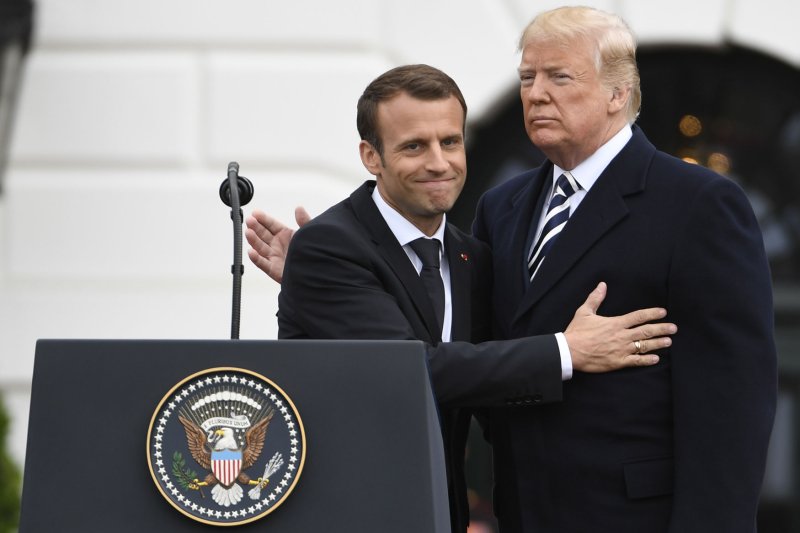President Donald Trump (R) and French President Emmanuel Macron embrace at the White House on April 24. The two leaders have different visions of the future in the Middle East. Photo by Mike Theiler/UPI |
License Photo
May 7 (UPI) -- Talk of imminent war between Israel and Iran, probably involving other regional and international players, increased following the recent Israeli airstrike on the T-4 airbase in Homs, Syria, in which several Iranian troops were reported killed.
Hostility between Israel and Iran is not new but it has reached unprecedented levels.
Israel first gave thought to launching a military strike on Iran's nuclear sites in 2008 but then-U.S. President George W. Bush made it clear he would not support such a strike. In 2009, former U.S. President Barack Obama shot down a similar Israeli plan.
Now, however, the mood in Washington is quite different and an Israeli strike against Iran could well be in the cards. Two dates in the near future will be decisive in this regard. The first is Saturday, by which U.S. President Donald Trump must decide whether to reimpose economic sanctions on Iran or keep the Iran nuclear deal intact.
Trump, largely seen as unpredictable and impulsive, teased the world about his possible plans, saying, "I'm not telling you what I'm doing but a lot of people think they know."
Faced with such uncertainty, Iran could be preparing for a pre-emptive response. Islamic Revolutionary Guard Corps Brig. Gen. Hossein Salami hinted at this in April, saying the IRGC had proposed that the country should withdraw from the Joint Comprehensive Plan of Action and the Treaty on the Non-Proliferation of Nuclear Weapons so it could resume its nuclear activities unhindered.
The second date to look to is May 14, when the United States is scheduled to open its embassy in Jerusalem. The controversial move is expected to provoke unrest across the Muslim world, among both Sunnis and Shias. By mobilizing its Shia proxies, Iran may capitalize on this unrest and provoke a bloody response to the U.S. move.
The growing risk of Iranian aggression comes as Trump is looking to chart a different course than his predecessors. On more than one occasion, Trump has shown that he is neither a warmonger like Bush nor a diplomat like Obama. This means he would not shy away from a limited showdown with Iran that could shore up his counter-Iran strategy without ensuing costs or obligations. Ultimately, Trump might end up supporting war waged by Israel against Tehran and its Shia proxies in Syria and Lebanon.
Now more than ever, world leaders are expressing different visions of the future. French President Emmanuel Macron has said that "nobody wants a war in the region and nobody wants an escalation in terms of tension in the region." Israeli Defense Minister Avigdor Lieberman, however, has said the Israeli Defense Forces are "prepared for all scenarios."
Meanwhile, Iran has continued to make risky bets to expand its regional influence and further entrench its presence in Iraq, Yemen, Syria, Lebanon and Bahrain.
With its strategic location and with the help of proxies, cyberattacks and assassination squads, Tehran has been capable of punching above its weight. Its latest destabilizing effort was in Morocco.
On Tuesday, Morocco announced it was severing ties with Tehran over its support for the separatist Polisario Front in the disputed Western Sahara region. Morocco accused the Iran-backed Shia group Hezbollah of arming and training members of the Polisario Front.
In light of Iran's continued meddling in sovereign nations' affairs, many in the region are convinced that a showdown is unavoidable. However, an escalation with Israel might be counterproductive. Not only would it put the impetus on Israel, viewed as a criminal occupation state by many Arabs, to lead the counter-Iran effort, it would risk increasing sympathy to Iran throughout the Muslim world.
Iran, as we know it today, is surely heading to an end. How that will happen, however, is unclear and the devil is in the details. It should be clear that any attempt to write an end to the mullahs' regime and their expansionist agenda through the hand of an occupation force will not succeed nor garner international support.
The Iranian regime is increasingly isolated and faces crises on both the domestic and international levels. At home, Tehran is dealing with an ailing economy; regionally, its interference in Arab countries has caused an irreparable divide; and, on the international level, Iran faces growing hostility in view of its alleged support for terrorist groups and development of missiles in defiance of U.N. Security Council Resolution 2231.
All of this points to an Iran that is increasingly isolated and on the verge of disintegration. However, the international community should tread carefully and tighten the screws on Tehran while avoiding any scenario that could trigger region-wide war.
This article originally appeared at The Arab Weekly.















